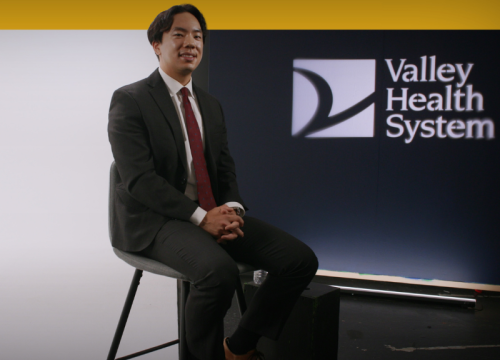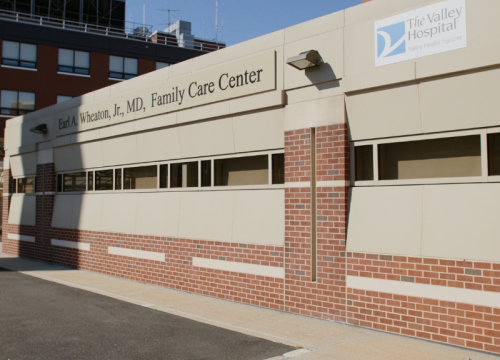Spinal tumors can grow anywhere along the spinal column including from the bones and tissues that cover the spinal cord. They can also grow in the spinal cord and spinal nerves.
Tumors involving the bones of the spine can press on the spinal cord or nerve roots causing dysfunction. This can lead to pain and nerve damage that can cause permanent disability. Getting treatment quickly, however, may prevent such complications from developing or worsening.
Some tumors begin in the spine and can be benign (noncancerous) or malignant (cancerous). More often, malignant spinal tumors come from cancer that has spread from other organs, such as the lungs, breast, or prostate.
At Valley, our neurosurgeons use minimally invasive techniques to treat both benign and malignant spinal tumors. This typically includes a combination of minimally invasive spine surgery and stereotactic radiosurgery (SRS).
Spinal Tumor Symptoms
Tumors of the spine may cause:
- Severe back pain that often:
- Spreads to the hips, legs, feet or arms
- Worsens over time
- Doesn’t improve with standard, non-surgical remedies
- Loss of sensation or poor coordination in the extremities
- Bowel or bladder problems
- Muscle weakness, muscle spasms, or loss of muscle function
- Scoliosis or other spinal deformities
Spinal Tumor Treatment at Valley
Your spinal tumor treatment plan will depend on the type of tumor and your symptoms:
- The first step is to obtain advanced imaging to define the tumor location and involvement of surrounding tissues. From there, we can determine the right treatment plan for you.
- The treatment goal for spinal tumors is to relieve the pressure on the spinal cord and nerves, maintain proper spinal alignment, and treat pain caused by the tumor.
- We may recommend non-surgical treatment such as chemotherapy and/or radiation therapy for some tumors.
- For tumors that require surgery, we have minimally invasive spine surgery options to remove it.
- We may also recommend other services, such as physical therapy, to help you regain function and muscle strength.
Minimally Invasive Spinal Tumor Surgery
Valley neurosurgeons are highly experienced in using minimally invasive techniques to address spinal tumors.
For instance, we offer separation surgery, which allows us to stabilize the spine and separate the tumor from the nerves and spinal cord. This separation allows us to deliver high doses of radiation therapy to the tumor without injuring your spinal cord.
And we’re able to do these separation surgeries using much smaller incisions than ever before. In the past, this was a 5- to 7-hour surgery that required large incisions and several weeks of recovery.
Today, however, we use small incisions and advanced navigation systems to minimize tissue trauma. This results in a shorter surgery and faster recovery. In fact, patients are typically out of bed and starting physical therapy the next day.
Compared with traditional spine surgery, other benefits of this minimally invasive approach include:
- Less pain and bleeding
- Fewer side effects
- Ability to get back into cancer treatment (e.g., chemotherapy, radiation) sooner
Why Choose Valley for Spinal Tumors?
- Expertise in minimally invasive spine surgery: Our neurosurgeons have years of experience performing minimally invasive spine surgery for spinal tumors. These techniques help improve recovery times — allowing you to get back into treatment more quickly. And we know that the sooner you can get back into treatment to kill any remaining cancer, the better chances for a good outcome.
- Multidisciplinary, team approach: Our patients benefit from Valley’s multidisciplinary approach that integrates the expertise of many different specialists. Our team includes neurologists, neurosurgeons, medical oncologists, radiation oncologists, pathologists, neuro-radiologists, a neuro-psychologist, and a highly skilled nursing team.
- Individualized treatment plans: Our team works with you — and with each other — to create a tailored treatment plan that best fits your situation. That includes focusing on your physical and medical needs as well as your emotional needs.
- Advanced radiation therapy: If radiation is part of your treatment, Valley offers the most advanced and most accurate treatment system available. With ExacTrac by BrainLab, your doctor can target the tumor with unparalleled precision and monitor your treatment as it’s delivered. Using this technique, radiation therapy can sometimes be completed in as few as three to five treatments.
- Mount Sinai partnership: Valley and Mount Sinai have partnered to create additional opportunities for our patients with cancer. That includes being able to access a greater number of cancer clinical trials and Mount Sinai’s cancer specialists.
- Clinical research: Many of our team are engaged in cutting-edge research to expand treatment options and improve patients’ quality of life during and after treatment.
















